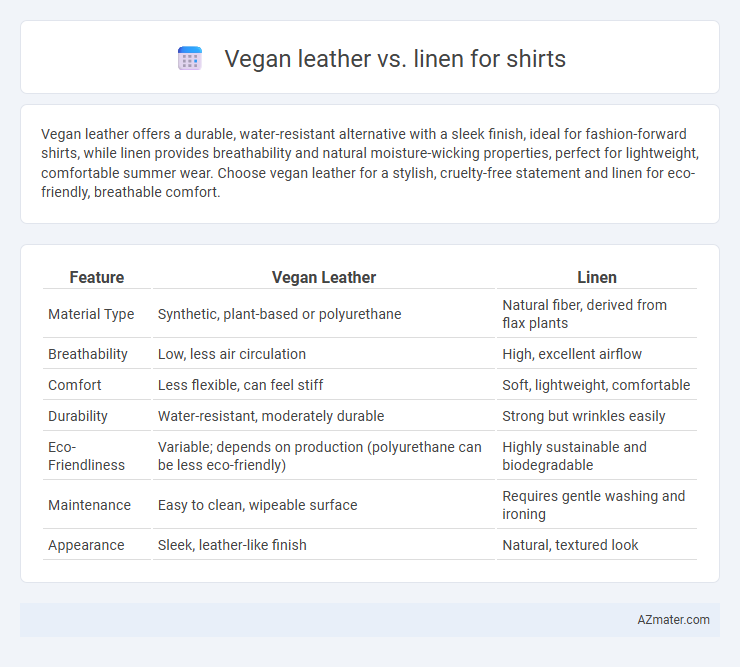Vegan leather offers a durable, water-resistant alternative with a sleek finish, ideal for fashion-forward shirts, while linen provides breathability and natural moisture-wicking properties, perfect for lightweight, comfortable summer wear. Choose vegan leather for a stylish, cruelty-free statement and linen for eco-friendly, breathable comfort.
Table of Comparison
| Feature | Vegan Leather | Linen |
|---|---|---|
| Material Type | Synthetic, plant-based or polyurethane | Natural fiber, derived from flax plants |
| Breathability | Low, less air circulation | High, excellent airflow |
| Comfort | Less flexible, can feel stiff | Soft, lightweight, comfortable |
| Durability | Water-resistant, moderately durable | Strong but wrinkles easily |
| Eco-Friendliness | Variable; depends on production (polyurethane can be less eco-friendly) | Highly sustainable and biodegradable |
| Maintenance | Easy to clean, wipeable surface | Requires gentle washing and ironing |
| Appearance | Sleek, leather-like finish | Natural, textured look |
Introduction to Vegan Leather and Linen Shirts
Vegan leather shirts offer a cruelty-free and sustainable alternative to traditional leather, made from synthetic materials or plant-based sources like pineapple leaves or cork, providing durability and a sleek, polished look. Linen shirts, crafted from flax fibers, are highly breathable, moisture-wicking, and ideal for warm climates, known for their natural texture and lightweight comfort. Choosing between vegan leather and linen shirts depends on preferences for ethical fashion, climate suitability, and desired texture.
Material Origins: Vegan Leather vs Linen
Vegan leather is a synthetic material derived primarily from polyurethane or plant-based sources like pineapple leaves and cactus, designed to mimic animal leather without animal exploitation. Linen is a natural textile obtained from the flax plant, known for its breathability and eco-friendly cultivation process. Both materials offer distinct origins--vegan leather combines innovation with sustainability, whereas linen draws from traditional, renewable agricultural practices.
Sustainability and Eco-Friendliness
Vegan leather, often made from polyurethane or plant-based materials such as cork or pineapple leaves, offers a cruelty-free alternative to traditional leather but can have varying environmental impacts depending on production methods and chemical usage. Linen, derived from flax plants, is highly sustainable due to its low water requirement, biodegradability, and minimal pesticide need, making it an eco-friendly fabric choice for shirts. Comparing both, linen generally boasts a stronger sustainability profile with renewable sourcing and lower carbon footprint, while vegan leather's eco-friendliness depends largely on the specific materials and manufacturing processes involved.
Comfort and Breathability Comparison
Vegan leather offers a sleek, modern look but tends to lack breathability and can feel less comfortable for all-day wear due to its synthetic composition. Linen, made from natural flax fibers, excels in breathability and moisture-wicking properties, making it ideal for warm climates and prolonged comfort. For shirts prioritizing airflow and temperature regulation, linen remains the superior fabric choice over vegan leather.
Durability and Longevity of Each Fabric
Vegan leather offers moderate durability with resistance to water and stains, but it may crack or peel over time, especially with frequent wear. Linen fabric is highly durable due to its natural fiber strength, becoming softer and more comfortable with each wash while maintaining structural integrity. For long-term use in shirts, linen proves more resilient and breathable, ensuring extended longevity compared to the artificial aging of vegan leather.
Style and Aesthetic Appeal
Vegan leather offers a sleek, polished look with a modern edge, perfect for creating bold, statement shirts that emphasize a minimalist or avant-garde style. Linen presents a natural, breathable texture with a soft drape, exuding effortless elegance and a casual yet refined aesthetic ideal for warm-weather and relaxed fits. The choice between vegan leather and linen hinges on whether a sharp, futuristic vibe or an organic, timeless appeal is desired in shirt design.
Maintenance and Care Requirements
Vegan leather requires gentle cleaning with a damp cloth and should be kept away from heat sources to prevent cracking or warping, making it relatively low maintenance but sensitive to damage. Linen shirts demand frequent washing due to their natural fiber composition, often needing special attention to avoid shrinkage and maintain fabric breathability, with ironing recommended to prevent wrinkles. Both materials benefit from air drying, but linen's durability allows more frequent care without compromising its texture compared to the more delicate vegan leather surface.
Price and Market Availability
Vegan leather shirts typically have a higher price point compared to linen due to synthetic material production costs and niche market demand. Linen shirts enjoy widespread market availability, benefiting from natural fibers, affordability, and consumer preference for breathable fabrics. Vegan leather is less common in casual shirt designs, limiting options and increasing prices in most apparel retail channels.
Ethical Considerations in Fabric Choice
Choosing vegan leather over linen for shirts involves ethical considerations centered on animal welfare and environmental impact. Vegan leather, made from synthetic or plant-based materials, avoids animal exploitation but may raise concerns about plastic use and carbon footprint. Linen, derived from flax plants, offers a biodegradable and low-impact alternative, promoting sustainable farming practices and reduced chemical usage.
Final Verdict: Choosing the Right Shirt Material
Vegan leather offers a sleek, water-resistant finish ideal for fashion-forward, durable shirts, while linen excels in breathability and moisture-wicking, perfect for lightweight, comfortable wear in warm climates. Consider the environment: vegan leather often involves synthetic materials with a higher carbon footprint, whereas linen is a biodegradable, natural fiber promoting sustainable fashion. Choosing the right shirt material depends on your preference for style, comfort, and ecological impact--linen suits casual, breathable garments, while vegan leather complements edgy, statement pieces.

Infographic: Vegan leather vs Linen for Shirt
 azmater.com
azmater.com